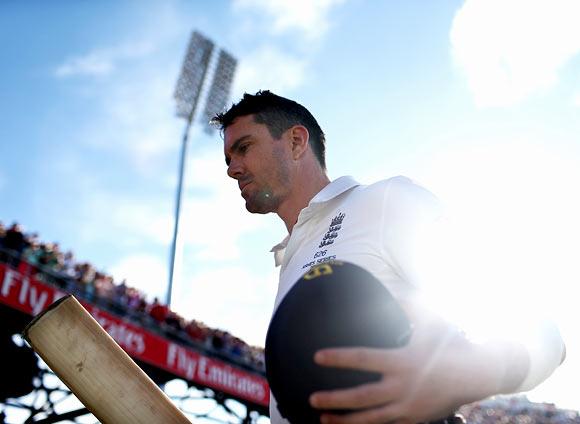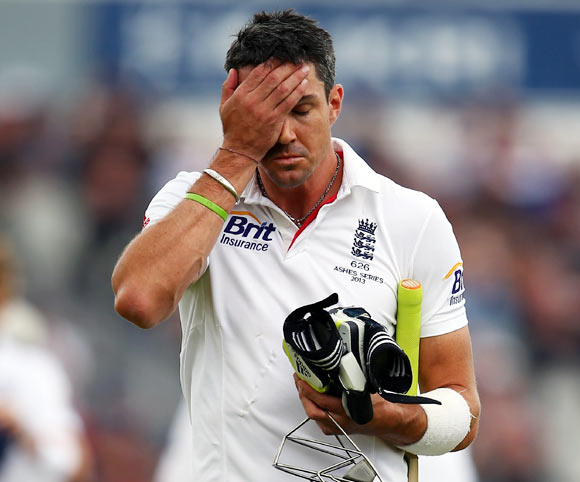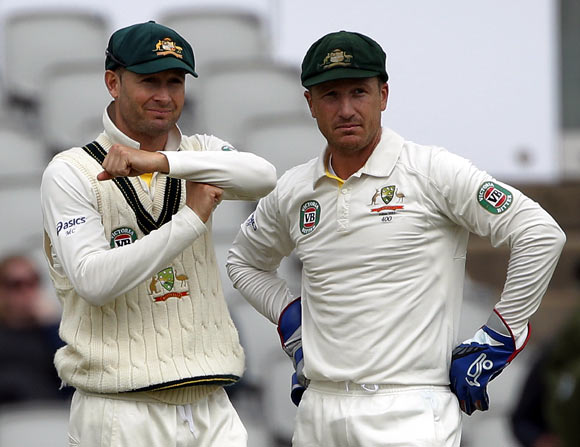Photographs: Ryan Pierse/Getty Images
The International Cricket Council (ICC) has denied it is investigating players in the Ashes series over alleged attempts by some batsmen to use silicone tape on the edge of their bats to confuse Hotspot technology.
Australia's Channel Nine TV reported on Wednesday that the ICC was investigating the use of silicone, amid increasing controversy during the five-Test series between England and Australia over the inconsistency of the Decision Review System (DRS).
"These media reports are totally incorrect," ICC chief executive Dave Richardson said in a statement on its website (www.icc-cricket.com).
"Geoff Allardice (ICC general manager cricket) is meeting with both teams and umpires to see how we can best use the DRS and the available technology going forward in the next two Test matches. It has nothing to do with any players."
The Channel Nine report had suggested Richardson was to investigate attempts to cheat the effectiveness of Hotspot, which uses infrared cameras to determine whether the ball has struck the batsman, bat or pad, with any contact supposed to show up as a bright spot on the image.
Cricket Australia last week requested an explanation from the ICC over the dismissal of Usman Khawaja during the third Test at Old Trafford.
The batsman was given out caught despite a review of the television pictures and Hotspot which showed no convincing evidence of a nick off the bat.
'I am never afraid of getting out! If I nick it, I'll walk..'
Image: Kevin PietersenPhotographs: Michael Steele/Getty Images
Later in the same match, England batsman Kevin Pietersen was also given out, caught behind, but again the Hotspot failed to pick anything up.
The outspoken batsman was angered at being linked to the use of silicone and sent out a series of angry tweets.
"Horrible journalism yet again! My name brought up in hotspot crisis suggesting I use silicon(e) to prevent nicks showing! Such hurtful lies," Pietersen wrote.
"I am never afraid of getting out! If I nick it, I'll walk.. To suggest I cheat by covering my bat with silicon(e) infuriates me," he added.
"How stupid would I be to try & hide a nick when it could save me on an LBW appeal, like in 1st innings where hotspot showed I nicked it."
'It's in the spirit of the game not to do that sort of thing'
Image: Australia's captain Michael Clarke signals to review the umpires decision as he stands with Brad HaddinPhotographs: Phil Noble/Reuters
Australian all-rounder Steve Smith also denied the allegations, telling a news conference that while batsmen used tape to help make their bat last longer, that did not extend to the use of silicone.
"It's in the spirit of the game not to do that sort of thing, we haven't discussed anything about trying to cheat the system at all," he said ahead of Friday's fourth Test at Chester-le-Street.
Hotspot's Australian inventor, Warren Brennan, was reported in the British media to be preparing a statement on the technology for release on Wednesday.
A tweet posted on Tuesday from an unverified Twitter account under his name and entitled @HotSpotInventor read: "We will make a statement tomorrow about hotspot in regard to the remainder of the Ashes series."
Another, in reply to former England captain and media pundit Michael Vaughan posted on August 5 read: "Michael, its time you investigate why players are using fibreglass tape on the edges of their bats."
England coach Andy Flower also called for improvements in the DRS system after the third Test was drawn, ensuring the hosts, who won the first two Tests, would retain the Ashes.





Comment
article